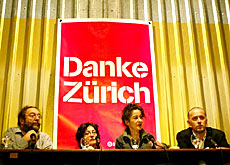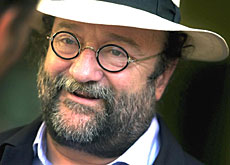Marthaler case rocks Swiss theatreland

The shock sacking of critically-acclaimed Zurich theatre boss, Christoph Marthaler, has highlighted the pressures directors face to please audiences.
The board of Zurich’s “Schauspielhaus” cited poor audience figures as one of the main reasons for their decision.
But was Marthaler’s crime really one of empty seats and coffers or was it symptomatic of a change in political attitudes to the dramatic arts in Switzerland?
His sacking has shocked Switzerland’s cultural elite who have attacked the timing of the decision.
Indeed, a few days before Marthaler was given the axe, the Schauspielhaus was voted the best German language theatre by the magazine “Theater Heute” for the second consecutive year.
It also came despite an increase in annual government subsidies, which were boosted in June by SFr3.9 million to SFr33.7 million ($22.56 million) to shore up a depleted budget.
“The decision to fire me came at the wrong time,” Marthaler said on Monday.
Around one thousand Marthaler supporters demonstrated in Zurich on Tuesday night in support of the director whom they believe was unfairly dismissed by the board.
Manager and creator
The seeds of Marthaler’s downfall appear to lie in his failure to manage the business side of the theatre as well as the artistic side.
The “Schauspielhaus” appointed the celebrated director for a five-year term in September 2000 to build on the Zurich theatre’s world-class status.
However, the theatre issued a statement at the weekend warning of potential bankruptcy after audience numbers declined from a yearly average of 170,000 to 120,000 during the 2001-2 season.
Comparisons have been drawn with Marthaler’s colleague in charge of Zurich’s famed Opera House, Alexander Pereira, who has been more successful at filling seats and the coffers.
However, the former mayor of Lausanne, Yvette Jäggi, who is credited with revamping the city’s cultural scene and making it the home of the famed Béjart Ballet, believes that this comparison is unfair since theatre and opera serve two very different functions.
“Sponsors love opera because it is a social activity and is not as provocative as the dramatic arts … which has for centuries played an important role in social debate, fulfilling a different function to opera,” she said.
More cash needed
As a result, Jäggi believes that theatre should get more financial support from the public sector, which should be more “willing” to support culture.
“The signs politicians give are decisive and those that are coming out of this decision to sack Marthaler – which evidently are attributable to the mayor of Zurich – are disastrous. It signals a lack of ambition,” she said.
Jäggi believes that more onus should be placed on politicians in charge of culture “to create a good climate for cultural institutions.”
She says it is up to the artistic directors “to build fascinating and interesting seasons.”
The artist, should be judged on their “artistic activity and not on their public relations ability”, warned Jäggi.
Politically incorrect
Marthaler, who pursued his own agenda and an artistic programme that leans toward the provocative, fell foul of the political elite who control state theatre’s purse strings.
However, Francois Rochaix, the director of Carouge Theatre in Geneva, believes that the Zurich authorities should have expected audience attendance to drop given Marthaler’s reputation for staging unconventional works.
“The decision smacks of capriciousness. They paid for Marthaler and then decided that things were not going according to plan. All this strikes me as very superficial,” Rochaix told swissinfo.
“I think it happened much too soon,” he said. “When you hire an important director like Marthaler, you should give him at least three to five years to find his audience and determine his place in Zurich.
“I think it is dangerous when things happen so fast especially since artistically he put on a very good season.”
Performing to a budget
The whole affair is being seen in some circles as evidence of a wider malaise facing Swiss theatre, where more emphasis is placed on profit rather than on performance.
According to Jäggi, a new climate in Zurich theatreland increasingly leaves directors at the mercy of their budget, to the detriment of the artistic programme.
Theatre directors are required to carefully balance the economic constraints with the artistic demands.
“I also have to manage a budget and I read almost every invoice. The job is both artistic and administrative,” said Rochaix.
The issue of boosting cash flow is increasingly important. “We talk about success when a theatre is 100 per cent full, and that’s a shame.”
From confrontation to dialogue
In addition to the financial problems at the Schauspielhaus, the relationship between those politicians who control theatre and its directors has also changed, says Rochaix.
Nowadays, directors need to be skilled in the art of dealing with the powers-that-be rather than doing battle with them as was the style some 30 years ago.
“I am convinced, after running theatres in Geneva for 20 years, as well as in Scandinavia, England and the United States, that we should try to explain … and make sure that the politicians agree with the general orientation,” he said.
“While it is worth having this dialogue, we have to pay attention that it doesn’t mean that we make any artistic concessions.”
swissinfo
Marthaler was born in Zurich in 1951.
He began his theatrical career in Zurich and moved to work in many German-speaking theatres including in Berlin and Hamburg.
He won critical acclaim while being viewed as provocative.
He took over the reins of the “Schauspielhaus” in September 2000.
Theatre attendance dropped from an average of 170,000 to 120,000 during his first season.

In compliance with the JTI standards
More: SWI swissinfo.ch certified by the Journalism Trust Initiative

You can find an overview of ongoing debates with our journalists here. Please join us!
If you want to start a conversation about a topic raised in this article or want to report factual errors, email us at english@swissinfo.ch.